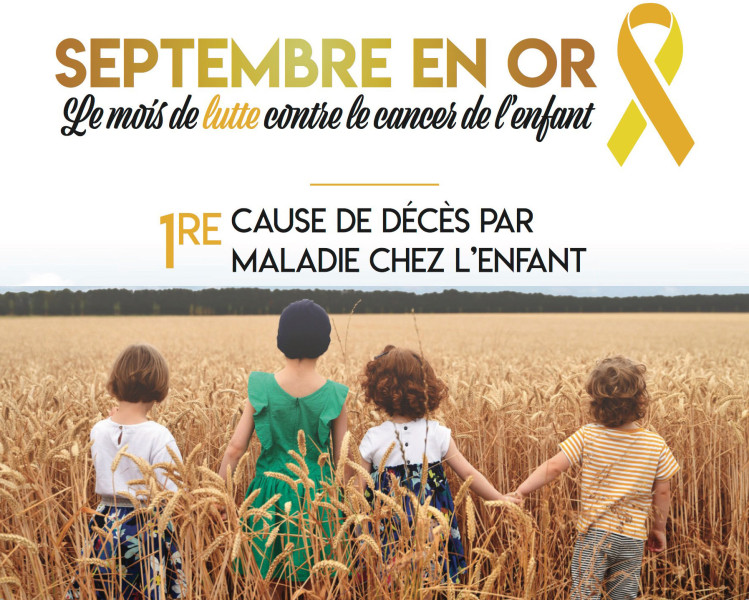Charity dedicated to the fight
against childhood cancer
against childhood cancer

Broadcast during "September en or", a month of awareness raising for childhood cancers, this platform written by the Grandir Sans Cancer Federation and the Eva pour la vie association was co-signed by more than 130 cross-party elected officials, including Paul Christophe , president of the social affairs committee (Nord, HOR), Vincent Thiébaut (Bas-Rhin, HOR), Virginie Duby-Muller (Haute-Savoie, DR), Michel Lauzzana (Lot-et-Garonne, ENS), Philippe Fait (Pas-de-Calais, ENS), Charlotte Goetschy-Bolognese (Former MP for Haut-Rhin, ENS), François Ruffin (Somme, Ecologist and social), Sandrine Josso (Loire-Atlantique, The Democrats), Karine Lebon (La Réunion, Democratic Republican Left), Christine Pirès Beaune (Puy-de-Dôme, Socialists), Pierre Cazeneuve , Vice-president of the Ensemble pour la République group (Hauts-de-Seine, EPR), André Chassaigne, President of the GDR group (Puy de Dôme, GDR), Arthur Delaporte (Calvados, SOC), Sébastien Peytavie (Dordogne, Ecologist and social), Cyrielle Chatelain , President of the Ecological and Social Group (Isère), Alexis Corbière (Seine-Saint-Denis, Ecologist and social), Agnès Firmin-Le Bodo , former minister (Seine Maritime, HOR), Michel Herbillon (Val-de-Marne, Republican Right), Emilie Bonnivard (Savoie, DR), Béatrice Descamps (former MP for the North) and Maryse Carrère , senator and president of the European Social Democratic Rally group (Hautes-Pyrénées) and Béatrice Descamps (former MP for the North, LIOT) ...
It was also co-signed by numerous associations, doctors and researchers . Among them: All united for Mélissa (Marseille), Association Laurette Fugain (Paris), Aidons Marina (Lyon), Constance the little astronaut warrior (Toulouse), LEA (Nice), Le Sourire de Lucie (Cambrai), Stop our children's cancers (Nantes), Health Prevention Group PEEP Federation (Paris), Petit cœur de beurre , Rires De Héros (Besançon), Running Pour l'Espoir (Paris), Wonder Augustine (Lille), Pr Marlène Pasquet (hematoimmunologist at Toulouse University Hospital), Dr Catherine Devoldere , pediatric oncologist at Amiens University Hospital, Dr Hélène Pizzut (physician and head of the emergency unit at Montauban University Hospital), Dr Sébastien Apcher (Gustave Roussy Institute in Villejuif), Dr Laurent Turchi (Research Engineer Nice University Hospital & IBV), Dr Elise Quillent , doctor ...
" If my cancer comes back, I'm going to die. " These are the words of Mélissa, diagnosed at age 2 with a brain stem tumor, a pediatric brain cancer that stopped growing without treatment. A situation as rare as it is unexpected: there is no curative treatment for this cancer that only affects children, and which takes almost all of them.
Today, Mélissa is 24 years old, but she is afraid for her future. She notes, like us, that 500 children die of cancer each year in France, 6,000 in Europe, the equivalent of 240 school classes. It is their leading cause of death by disease, after accidents, and the survival rate remains particularly low for certain cancers specific to children. An unpredictable situation and even more unfair for children who do not drink, smoke or take drugs.
Certainly, a real effort has been made by the French government to accelerate basic research - that is to say laboratory research - on childhood cancers.
At the end of 2018, following the mobilization of Grandir Sans Cancer and committed parliamentarians, the government agreed to dedicate €5 million per year to basic research on childhood cancers. At the end of 2021, €20 million was added, unfortunately on an ad hoc basis, through the finance law. These resources have enabled the National Cancer Institute to set up ambitious calls for projects, improve human and material investment and structure the research teams working on childhood cancers.
The acceleration of scientific knowledge of these diseases would never have been possible without these means.
However, the research progress thus obtained will lead to improved healing only if this dynamic extends to the development of treatments and dedicated clinical trials.
However, to date, although there is a public hospital clinical research program on cancers (PHRC-K), a clear majority of the projects selected benefit adults suffering from the most common cancers: between 2018 and 2022, out of 177 projects funded, only 11 concerned children.
Furthermore, the effort made by major pharmaceutical companies in developing treatments for children with cancer remains very low . The current survival rate is essentially linked to the fact that some pediatric cancers can be treated with treatments designed for adults, very often at the cost of significant side effects. Since 2009, out of 150 anticancer drugs developed for adults, only 16 have been authorized for a specific indication of pediatric cancer. But they only concern tumors responsible for less than 4% of cancer deaths in children. Over the same period, no treatment has been specifically developed for children with the most deadly cancers. However, the "European pediatric regulation" has allowed several manufacturers to benefit from rewards that have an impact on their turnover, such as extensions to the duration of exclusive patents.
Faced with this situation, we cannot accept watching so many children die without taking action, in a country that has the means to do so. This is why we propose:
The implementation of such measures would be both humane and coherent, both economically and health-wise: if to date, we must wait "for a treatment to be developed for adults and hope that it will also have an effect on children with cancer", it would be likely that the research and treatments developed to improve children's health would also have an impact on adults!
France, a major player in terms of research, often a leader in terms of social justice, can also, through these measures, be a European example in its way of protecting and caring for those who bring us all together, whatever our cultural and social origins or our political ideals: the lives of children.